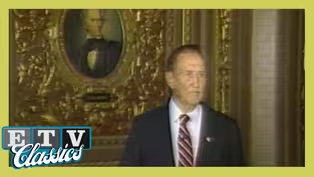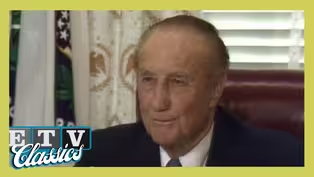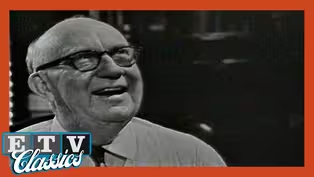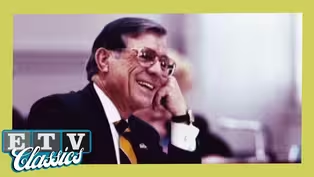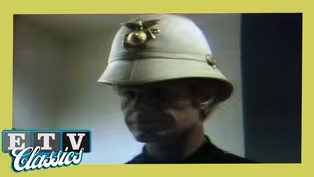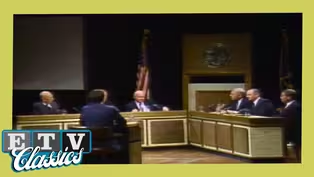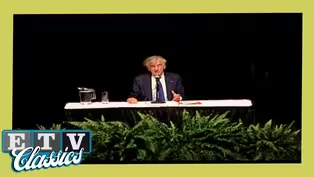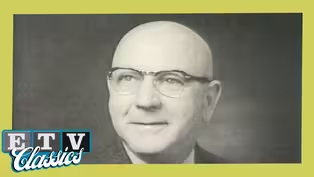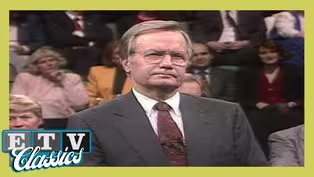ETV Classics
A Conversation with Justice Ernest Finney, Jr.: A Lifetime of Success (2000)
Season 15 Episode 19 | 27m 47sVideo has Closed Captions
The honorable Judge Ernest A. Finney, Jr. discusses his life, career, and legacy in SC's lawfare.
The honorable Judge Ernest A. Finney, Jr. sits down with host Krysten Fyfe to discuss his life, career, and legacy in South Carolina's lawfare. Finney was known as an outstanding defense lawyer and civil rights advocate and was elected to the S.C. House of Representatives in 1972.
Problems playing video? | Closed Captioning Feedback
Problems playing video? | Closed Captioning Feedback
ETV Classics is a local public television program presented by SCETV
Support for this program is provided by The ETV Endowment of South Carolina.
ETV Classics
A Conversation with Justice Ernest Finney, Jr.: A Lifetime of Success (2000)
Season 15 Episode 19 | 27m 47sVideo has Closed Captions
The honorable Judge Ernest A. Finney, Jr. sits down with host Krysten Fyfe to discuss his life, career, and legacy in South Carolina's lawfare. Finney was known as an outstanding defense lawyer and civil rights advocate and was elected to the S.C. House of Representatives in 1972.
Problems playing video? | Closed Captioning Feedback
How to Watch ETV Classics
ETV Classics is available to stream on pbs.org and the free PBS App, available on iPhone, Apple TV, Android TV, Android smartphones, Amazon Fire TV, Amazon Fire Tablet, Roku, Samsung Smart TV, and Vizio.
Providing Support for PBS.org
Learn Moreabout PBS online sponsorshipMore from This Collection
Find classic news and public affairs programming from South Carolina ETV.
Open Line: Carolina to Shanxi (1980)
Video has Closed Captions
An exchange program for higher education between USC and the people of China's Shanxi Province. (28m 51s)
Charleston Place | Carolina Journal (1986)
Video has Closed Captions
This edition of "Carolina Journal" revisits the opening of the Charleston Place complex. (27m 20s)
U.S.S. South Carolina | Carolina Journal (1984)
Video has Closed Captions
Michael Collins goes aboard the missile cruiser U.S.S. South Carolina as it visits its namesake. (28m 54s)
Strom Thurmond Remembered (2003)
Video has Closed Captions
Charles Bierbauer reviews the life and accomplishments of South Carolina Senator Strom Thurmond. (1h 51m 22s)
Strom Thurmond At The Seat of Power (1982)
Video has Closed Captions
The documentary follows the life and career of Strom Thurmond. (29m 49s)
Profile: The Senator from Barnwell: Edgar A. Brown (1967)
Video has Closed Captions
A visit with the venerable Edgar A. Brown in his law office, home, and the streets of his hometown. (14m 42s)
Profile: Senator John Drummond of Ninety-Six | The Big Picture (2008)
Video has Closed Captions
The life and times of Senator John Drummond of Greenwood, South Carolina. (26m 53s)
Video has Closed Captions
The memoirs of three businessmen who attribute their successes to their time in the US Marine Corps. (28m 54s)
The Governors' Roundtable | Carolina Journal (1989)
Video has Closed Captions
A round-table discussion with nine men who served as governor of the state of South Carolina. (57m 54s)
Elie Wiesel | Solomon Tenenbaum Lectureship in Jewish Studies (2006)
Video has Closed Captions
Professor Elie Wiesel, first Nobel laureate delivers a lecture as a part of the Tenenbaum series. (1h 17m 18s)
Solomon Blatt: Speaker Emeritus of the SC House | Carolina Journal (1985)
Video has Closed Captions
The life and career of Solomon Blatt, Speaker Emeritus of the S.C. House of Representatives. (27m 49s)
Remembering Bill Moyers: War in the Gulf - Town Meeting (1991)
Video has Closed Captions
Bill Moyers, who died June 26, 2025, was an award-winning journalist and PBS host. (59m 32s)
Providing Support for PBS.org
Learn Moreabout PBS online sponsorshipAnnouncer> This program is made possible in part by The National Bank of South Carolina.
Announcer #2> A production of South Carolina ETV.
>> Good evening.
Tonight, we are pleased to present you, a conversation with retired South Carolina Supreme Court Chief Justice Ernest Finney Jr. Born during the Depression in rural Virginia, Finney, as he is known by friends, faced difficult odds from the start His mother died when he was only 10 days old.
His father, a teacher, traveled from job to job.
Being Black in the South in the '30s, '40s, '50s was not easy.
Following in his father's footsteps, he was a teacher, first in Conway, South Carolina, but his heart was in the law.
He was admitted to the South Carolina Bar in 1954, he attended his first bar meeting in 1954 as a bartender, because Blacks were not allowed in the bar at that time.
He always believed that the dream of the Declaration of Independence and the American Constitution could be a reality for every citizen.
He moved to Sumter to pursue his law career to make that happen.
He served in the State House of Representatives, initiating programs that are still in existence.
He was the first African American in over 100 years to be appointed to the Circuit Court, then the Supreme Court.
He was sworn in as chief justice in 1994.
Judge Ernest Finney rose above circumstances that might have kept a lesser man down, but not him.
♪ Kristen> Judge Finney, you have been called a trailblazer in your judicial career.
I would like know your opinion on that.
Ernest Finney> Well, I think that it's like most things... there's a bit of exaggeration in it.
I have done the very best I could under sometimes difficult, but sometimes very pleasant circumstances.
The fact that I happen to have been in a position where I got the jobs or positions that no one else of my hue had ever had does not mean that I'm a trailblazer so much as it means that the people of goodwill of Sumter and South Carolina have joined together and made progress.
My predecessor on the South Carolina Supreme Court was a man by the name of Jonathan Jasper Wright, who served in 1877 for a short period of time, seven years, I believe.
But we knew nothing about Jonathan Jasper Wright, except for the fact that he had served.
Recently, the South Carolina Supreme Court Historical Society has rejuvenated the story of Jonathan Jasper Wright and tried to make it live and give some projections of the history that we have.
Kristen> Do you think, though, that because you were the first in so many instances-- the first African American in...over 100 years to be appointed to the courts, first African-American chief justice of the supreme court in fact, makes you a trailblazer, in some regards, because you are the first to walk down that road?
What do you want your legacy to be?
Ernest> Basically, that I did what I could with the resources provided by the state of South Carolina to improve the criminal justice system and the civil justice system in the United States, or in South Carolina.
We had a system that was perhaps perceived differently than what it really is, and I hope that we have been able to make some contribution to broadening the perception of the court system and the judicial system.
Kristen> I want to take you back to the early days.
Your mother died when you were just a wee infant, 10 days old.
Your father was a teacher, you traveled extensively because of his jobs.
How did that affect you as a child and where do you think, when you look back-- hindsight being 20-20-- did that make you the person you are today?
Ernest> Oh, I think it definitely had some impact upon that.
It made me more likely to be able to adjust to different environs.
You know, when you go to a new school and you're the son of the teacher, there is a special disability you suffer under.
Because, all of the others have got to try you, and I got tried a lot coming along So trials and tribulations were nothing new to me when I came to South Carolina or when I began my legal career.
Kristen> You said that, the time you spent in Washington, D.C., as a youngster was very formative in you wanting to be a lawyer...why is that?
Ernest> The lawyers I met in Washington were well-dressed.
They were articulate.
They were what we would call smooth, and they were respected in the community.
I said, you know, that's a gig I could probably like...
I could get accustomed to that lifestyle.
Kristen> But it wasn't very common- Ernest>-Oh no!
Kristen>-in the 1950s.
Ernest> Oh, no, because Washington, D.C., was segregated at that time.
I remember that I worked at a place, and Black citizens were not allowed to eat in there in my lifetime.
The idea of segregation was not something that was old.
It's something that was new and was real.
Kristen> How do you see the changes coming through?
And let's talk about the segregation, because you have lived it, and...your wife has lived it.
In the South, as an African American, you have borne the brunt of that.
And in fact, the beginning of your legal career was really focused on making that change, the Civil Rights Movement.
Tell me about those days.
Ernest> Well, of course, it was difficult.
It's hard to get yourself up for trials or cases when you know that the law is against you.
But you have to believe that the law will eventually prevail and that justice will eventually prevail.
Those who served with me and who represented the "sit-in-ers" had to believe that eventually the promises of the Constitution and of the Declaration of Independence would be given real life and meaning one day or the other.
Kristen> You...made it into the bar, 1954, - Ernest> -Right!
Kristen> -just prior to the Brown-- or just after "Brown Ernest>-Just after Brown... Kristen> Brown v. the Board of Education," which was pretty much the watershed for the Civil Rights Movement.
It has been written that you pushed Brown to the limits in your early career as a lawyer.
Ernest> Well...we gave Brown a new meaning, hopefully to expand it.
You know, originally, the Brown decision dealt with governmental entities to school systems, and we pushed it to where it dealt with private entities, the stores, the five-and-tens, and various, and sundry public accommodations, for lack of a better word.
Kristen> And one of the, I mean you are a Sumter resident, you actually sued the city of Sumter back in the 1960s for access to the libraries for African Americans.
Morris College students were doing sit-ins.
Tell me about those days, what was it like to be really at the forefront of that movement in this town.
Ernest> It was amazing because there was no history to rely upon for that kind of movement in America.
We had the example of Mahatma Gandhi in India, but in America, to my knowledge, there had been no direct civil strife that was designed to improve the surroundings and the opportunities available for other citizens.
It was just a pure idea whose time had come.
The students in Greensboro started it.
It worked its way all around the country.
Students at Morris College started.
It went from one end of this country to the other.
It developed as an idea whose time had come.
We had students in Rock Hill, for example, who, they were getting convicted at the magistrate's court level because that's what the law required.
Normally what they'd do is they'd get convicted, the community would come together, post bonds, they'd get out, and we would appeal to either the South Carolina or the United States Supreme Court.
We won those cases, primarily, either in South Carolina or in the U.S. Supreme Court.
But I was representing 12 young people in Rock Hill who changed the idea.
They decided that they would serve their time to send the message.
They did serve their time, and the Rock Hill Ten became famous throughout the nation.
Kristen> Mrs. Finney, I'm sure that during these early days of lawyering that the pace was... just breathtaking, overwhelming, even.
How does that affect your family when you are watching your husband, really, and your children's father, set a standard, really, in lawyering in South Carolina?
Mrs. Finney> Well, believe it or not, through all of this, we had no fear.
We never had anything to happen to us to say, well, you know, we have a threat here and a threat there.
We never had any threats.
I was there with lots of work to do, with two children that we had at that time.
And, I think in the 60s, well, we did have another one that was born in Sumter, so I had a baby and two older children, and I was just busy.
I never had any help.
I did all of my work, all of the sewing, the cooking, the cleaning, the yard work.
I guess I didn't have time to have any fear, but, again, there was no reason, for me to have fear.
We read about fear in other, you know, states, but we never had a lot of fear in Sumter anyway.
Kristen> Did you realize then, I think sometimes, you don't when you're in the midst of controversy and change, like that, you don't see the impact until you look back on it.
When you were living that-- I'll address this to both of you-- did you realize that you were making change in history in this area?
Ernest> You go first.
Mrs. Finney> Well, yes, we realized that, because what we were doing had never been done before.
Sure.
But it was no big thing, you know.
It's just like when the papers would come out, and write all that would happen, we just tuck the papers away and say, "One day we're going to put all this together."
And looking back each year, we would smile and say, "Look what we did."
But we always knew that we did it with a large group of people who were helping us.
We couldn't do it by ourselves.
People believed in Finney.
When he came to Sumter, it was like they were just waiting for him to come, for that leadership.
Of course, Finney never had any fear.
Ernest> But, of course, yeah, I think, yes, we did recognize that there were going to be changes.
We did not recognize nor appreciate the depth of the changes.
And we always had hope that, every time you had a victory, that this would be the end of it, but that's never the case.
It's always a struggle to try to implement whatever the changes are for the betterment of citizens throughout the state.
In some areas, we have been extremely successful.
In other areas, we have been extremely unsuccessful.
Kristen> What would those areas be?
Where do you see the failures?
Ernest> The failures are that the progress that we were attempting to make and the ideas we were attempting to articulate were designed to improve the quality of life of the masses, and too often we have improved the quality of life for a few and not improved the quality of life for the masses, in general.
Kristen> You actually had a chance to make some changes and some big changes in the legislature.
You were elected in 1972... had been running for a few years before that and not elected...<three times> three times.
Tell me about, um... your proudest moment serving in the legislature.
Ernest> Well, I don't know if there was one specific moment.
I think the biggest surprise I had was-- when I got elected in 1972, the image of the legislature was that it was a body controlled by a group of kingmakers, the old leaders of the legislature.
I was advised that you're going to get assigned to the back row, you'll get assigned to committees and have no real input, and you won't have an opportunity to express your views.
Kristen> Because you were an African American they thought this, or just because you were the new kid on the block?
Ernest> Both, because you were the new kid on the block and had the added burden of being a Black.
On the other hand, I arrived in the legislature my first committee assignment was to the House Judiciary Committee.
I found that if you were prepared and if you didn't pick fights all the time, if you picked your issues you wanted to fight about, that they would listen to you.
That is one of the reasons why we formed what is now identified as the South Carolina Legislative Black Caucus, because I felt that it was important that we understood the rules and how the rules work.
Kristen> Your nickname, at the time was the "Black Fox".
I find that very intriguing.
And I would like for you to tell us the story behind it.
Ernest> Well, if you were a South Carolinian, you would understand that there was in the senate of South Carolina at that time a man by the name of Senator Marion Gressette, who was from Calhoun, who was a master of the parliamentary procedure.
Because of his mastery of that, he served as chairman of the Senate Judiciary Committee.
I think that being overly proud of what I was trying to do, some of my friends attached the-- he was known as the "Gray Fox"-- and I think, just, to try to show that I didn't know something about the rules, they called me the "Black Fox", and it stuck for a while.
But it was simply an idea that, you know, if you understand the procedure-- to give you an example, one year while I was in the legislature, a gentleman introduced a measure to reduce the budget of South Carolina State College by $500 thousand dollars.
Well, I was a graduate of South Carolina State, and that did not particularly appeal to me, so I made a series of amendments to the budget bill where we would have reduced the budget of every University of South Carolina branch by $50 thousand dollars, to get the 500,000 we needed for South Carolina State.
After the first one failed by 12 votes, I think the other side recognized that, sooner or later, this crazy might win one of these and reduce the University's budget.
Lo' and behold, they took a 5 minute recess.
He called me back into the office and said, "What do you want?"
I said, "I just want the $500 thousand dollars back at South Carolina State."
And we got it.
Kristen> Just like that.
Ernest> Just like that.
The legislative process is very interesting and intriguing, and I enjoyed it tremendously.
You know, the old saw is quite accurate... that anybody who likes sausage or the law should never watch either one of them made.
But it's amazing how often this system works.
Kristen> Two sons are lawyers, a daughter, who is a professor at University of Kentucky, who wrote a poem and read it at your swearing-in as chief justice, which I understand made you a little teary.
Ernest> It did.
Kristen> And we are going to be taking a look at that.
What do you feel as parents, and I'll ask you first, Mrs. Finney, when you see the success that your children have achieved?
Do you think it is because of the examples you've set to let them know that anything is possible?
Mrs. Finney> Well, I do think that if you live right-- because right now, if I had my life to live over again, I don't see anything that I'd change.
It's not that "Oh, I should have done,..." When my children were little, reading every night.
Not a night that went by, no matter how tired we were, reading, reading, reading, and so they were all interested in books, wanted to read, and Lynn stayed in the library.
We never had any problems, but I always started introducing them.
Like Chipper got up the other day, and said his parents introduced him to the world at an early age.
And, see, they know that... they were just exposed.
What's the guy that he talked about in church Sunday?
Ernest> Leroy Johnson.
Mrs. Finney> Leroy Johnson, and the one in Washington?
Ernest> Oh, Vernon?
Mrs. Finney> Vernon Jordan.
They played marbles with Chipper in our backyard in Sumter early on.
We just invited all those folk to come to the house.
Ernest> And they couldn't stay at hotels, so they had to stay somewhere!
Mrs. Finney> Yeah, they couldn't stay at hotels, so when they were in town on speaking engagements they came to our home.
And so, it was hard work, though.
Kristen> I want to ask you about the day you were sworn in as the first Black Supreme Court Justice of the state of South Carolina, the picture that was ran in the paper, of you holding your granddaughter...
I'm sure one of the proudest moments of your life.
What is going through your head?
Ernest> I think my thoughts were-- I tried to say it in my speech, and that was that something about today was the day for the people of goodwill of South Carolina to be happy and thankful, because though I was standing there getting the accolades-- and got the job-- I knew full well, that I was standing on the shoulders of people like Jonathan Jasper Wright, the people in the Civil Rights Movement, the good people, White and Black, who created the atmosphere where I could get elected.
Kristen> When your daughter read the poem that she wrote, Ernest> She just-- Kristen> "The Little Brown Corduroy Boy," had you heard it before?
Ernest> Oh, no.
That was one of the ground rules, you know.
She got up, I didn't know what she was going to say.
I was afraid out of my mind, that she was going to say something wild!
You know, these poets, you have to understand, go in their own, they march to a different drummer.
So I didn't know what she was going to do, but she surprised me, she did herself proud.
Kristen> What did you think when she came to that last, the last line?
Ernest> Well, I thought that her grandmother would have been extremely proud, because I was extremely proud.
I don't cry easy, and it brought tears to my eyes.
Nikky Finney> "He never had it made.
♪ "Just an ordinary brown boy from a place and people "who sweet-fed him everything they had in double doses, "just in case, his man-sized pockets "should ever have a hole in them.
"Just an ordinary brown corduroy boy "from a people who never had it made, "but who still managed to make "whatever they were to be from scratch.
"An ordinary boy whose mother "never got to bathe or watch him grow "or gaze him from the farmhouse window "where he loved to sit on a summertime box "of Virginia-cured daydreams, "umbrella-ed" by the big oak tree and in between chores, "and stare away at the long dirt road, "the only way, in or out, to Grandpop's farm.
"The same road that all country boys "try to stare down in their day, "wondering what or who could ever be at the other end.
"Watching it for signs of life.
"Maybe somebody from the city might visit "from one of those shiny, ready-made places "who could make magic "of an ordinary brown boy's country-fried life.
"Maybe one of those places far away "would take him just as plain as he was "and grow him up to be something legal, "maybe even handsome, even dap, debonair.
"Somebody who could easy talk for the regular folk "and then articulate smooth to all the others "when those folk needed him to be shiny as new money, "just for them.
"He wanted to be like one those new Black men "who came visiting from the North to the South, "talking pretty at the State College of South Carolina "one of those kinds with the pocket change and the shiny gray suits "with a hundred pounds of law books under their arms, "like some kind of natural growth.
"He figured they were country boys, too, "who never had it made,... but who somehow had made it.
"They walked around like nobody else, "stout with the law on their minds "and a personal sense of justice in their hearts.
"Maybe he could be one of those when he grew up.
♪ "He never had it made.
"But he had a proud father "and a circle of people who kept his dying mother's promise "to raise the boy up at their sides, "and not just anywhere with strangers.
"His own mother knew he would never have her there "to do the raising herself.
"Today is a long promise kept, Mama Colleen.
♪ "This one-- that one there-- he never had it made.
"He might of had it sweetened and sifted, "chewed up and spit out, "prayed over and molded around, "made from scratch in somebody's kitchen... ♪ [voice breaking emotionally] "over somebody's fire, "beneath his grandfather's wagon wheels, ♪ "under his daddy's stern tutelage, "but he never had it made.
"You know the way I mean, "all silverized and shiny, handed down.
"He might of had it boiled up, "explained and defined, and fried and 'gravy-ed' "by an early rising grandmother "or a significant Claflin College.
"He might of even fished it out "and washed it down himself in scalding water a time or two.
"I'm quite sure he soda-jerked it through and through "and baked his dreams in enough tears and high hopes "to try and make sure it was going to happen.
"But he never had it made.
"It was never given to him on some royal platter, "never promised at his birth.
"The making of this man's life... ♪ [voice breaking] "came from saltwater tears, "saltwater sweat, "from love and hard work, "and from the graciousness of his God.
♪ "He never had it made.
"But he always loved the law.
♪ "How he always loved the law.
[voice rising] "Even when his impulsive, passionate daughter "argued about history and what wasn't right or fair, "how the scales of justice never seemed balanced in her eyes, "how he always, with the calm of a sailor who knew the ocean "like an old, and faithful, well-traveled road, "he would say to her, 'The law works, girl,' ♪ "believing it completely as if he had written every word of it himself.
"His wise old sayings, steeped in patience, "always kept the law alive... "'A steady drop of water will wear a hole in a rock,' daughter "'Such are the vicissitudes of life, son.'
"'If you see me and the bear, you go ahead and help the bear, my friend?
"'It's all right, baby girl, you win some and lose some.'
"'Just do the best you can with what you got, everybody.'
"Hundreds of old adages always spilling from his mouth "like a Black historic fountain.
"He, to me, is the Justice Man.
"And he never had it made or delivered or prepaid "from his waiting tables as a young lawyer "to this day, right here.
"No statistic, no horrible crime, no lie, "no deep disappointment, no nothing human or man-made "has ever destroyed or made him give up on his law.
"He believed then... he believes now.
"It is his belief that is chief.
"Papa, Daddy, "the Justice Man, "I know you never had it made, "but here you are making it, "and all of us cross over with you, proud as peacocks.
"Maybe that's what Pop Finney, "maybe that's what Mama Colleen, would say."
♪ Kristen> Your legacy on the Supreme Court... some of the research that I was reading said that you think that probably the most important case you decided and that you wrote the opinion on was won last April, about minimally adequate education.
Ernest> A year ago, yesterday, or a day before that opinion was announced, we have school districts in South Carolina where the funding level is totally out of proportion to other school districts.
I would have liked to-- for the legislature to be addressing the question of a school district that does not have a tax base that would justify the kind of expenditures which other school districts have... that we would find a way to formulate a concept where all school districts get a minimum basis of support.
I believe, and the decision, I think, says that every child in South Carolina should have a minimally adequate educational opportunity... the ability to get an education that will prepare them for the kinds of jobs that are going to be coming along in 2020 and this kind of thing.
Kristen> I see a circle, then, in your career.
You started, really, as a teacher in Conway, had that back up plan there in case the lawyer thing didn't work out, became a lawyer as "Brown versus the Board of Education" really opened the door for Blacks in this country in terms of education.
And to have your most important decision you think be based on minimally adequate education for children of South Carolina, leads me to believe that your heart really is with the youth of the state.
Ernest> Absolutely... they're going to be in charge of the world when I'm senile, and I'd like to have an environment that would provide at least a reasonable degree of security and safety.
The other thing you must remember, is the more things change, the more they remain the same.
I believe in youth.
I...the press and various others talk about the fact that our youth are so scattered and wild and this kind of thing, but by and large, it's been my experience that when you go into a classroom or into a school and you relate and talk with those young people, you find an amazing reservoir of goodwill and dedication.
Kristen> And promise.
Ernest> And promise, That's the word I was looking for!
Kristen> Thank you so much, Judge Finney and Mrs. Finney, for letting us share this morning with you Ernest> Thank you.
Kristen> and for opening your home to us.
We really appreciate it.
Ernest> Thank you very much.
We're delighted to have had you.
♪ ♪ ♪ ♪ ♪ ♪ ♪ Announcer> This program is made possible in part by The National Bank of South Carolina.
Support for PBS provided by:
ETV Classics is a local public television program presented by SCETV
Support for this program is provided by The ETV Endowment of South Carolina.



